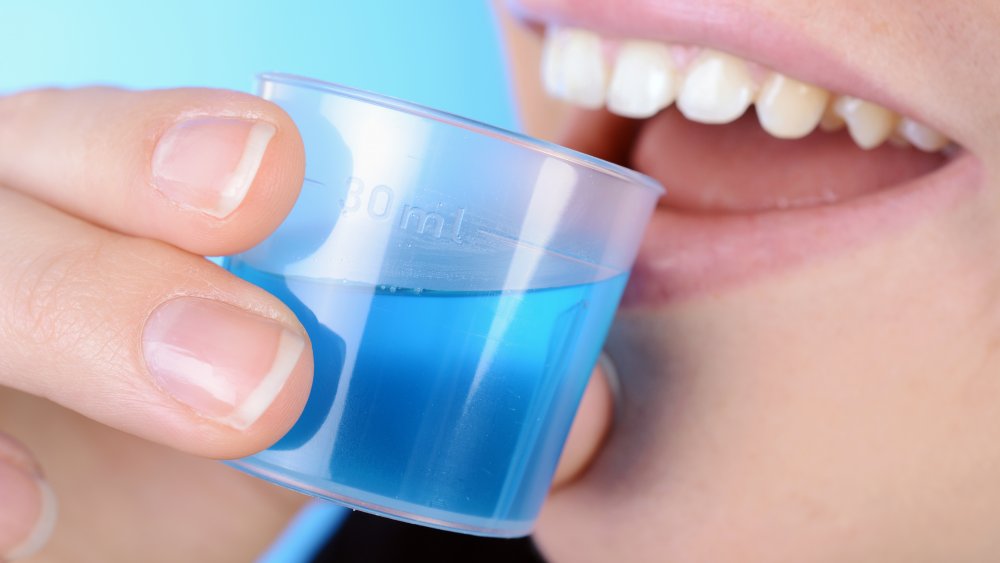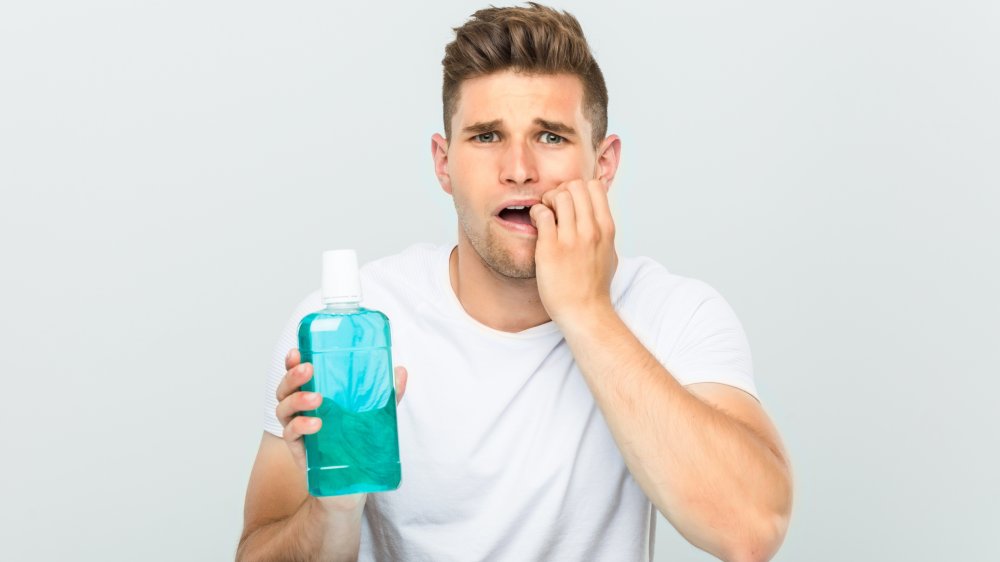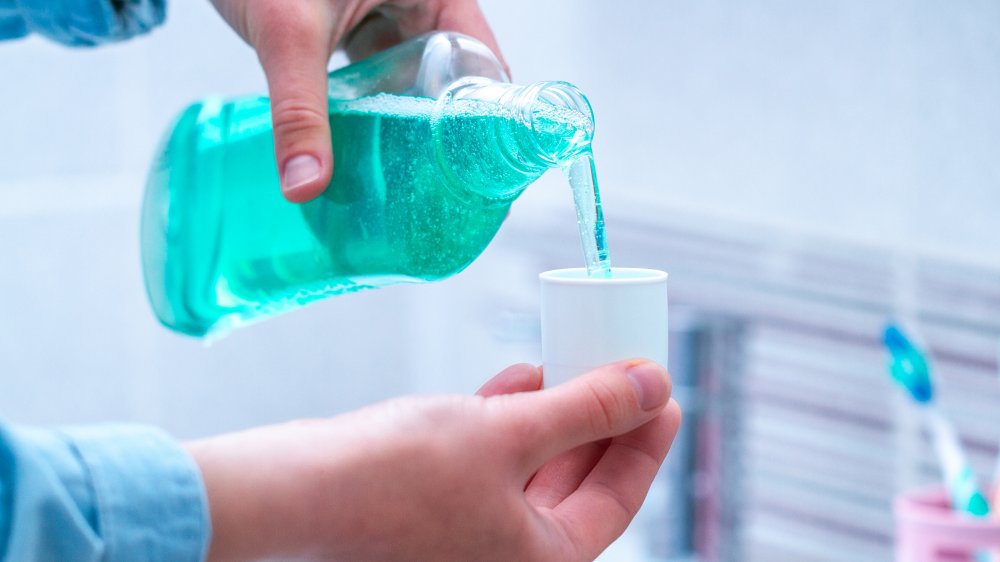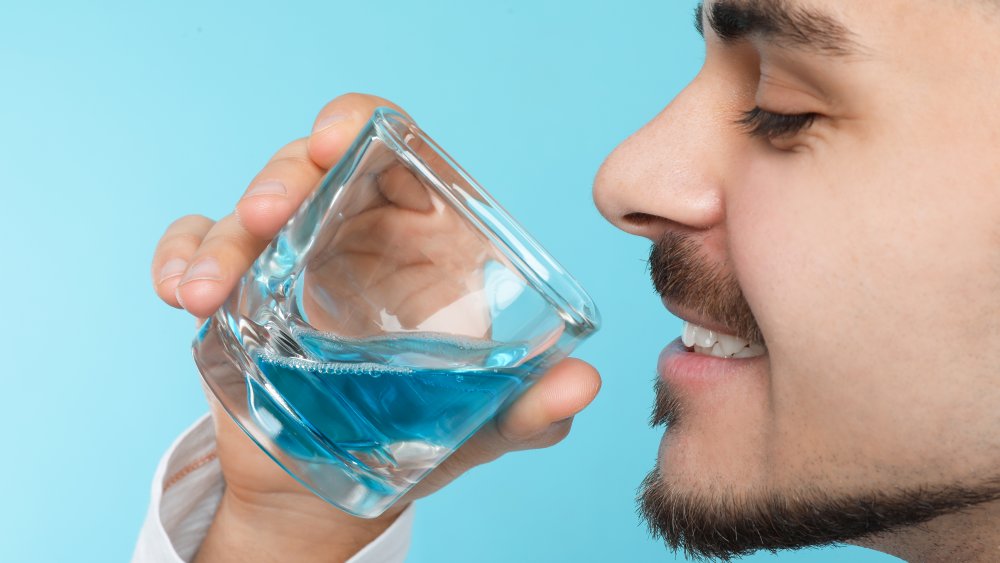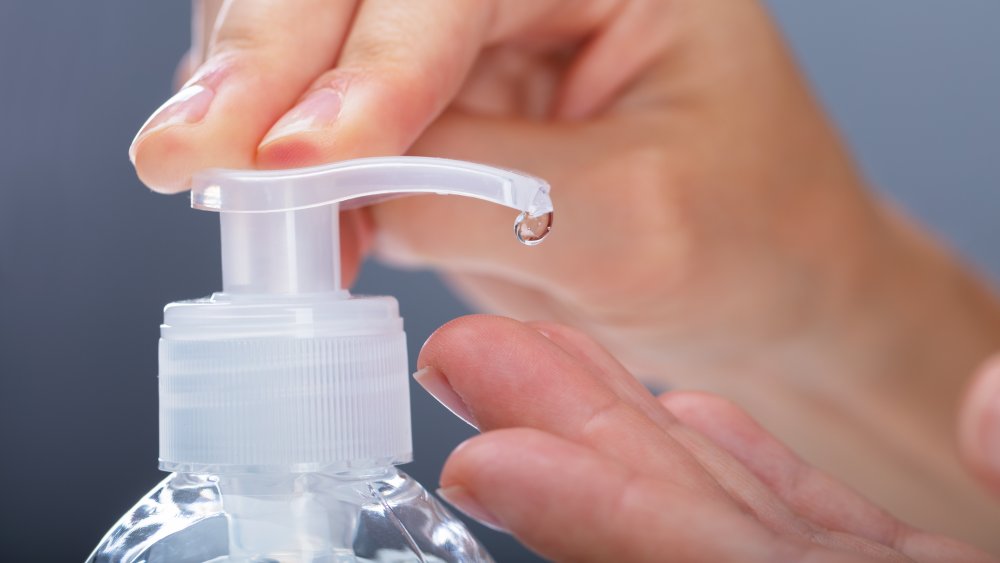What Happens To Your Body When You Drink Mouthwash
With its rancid toothpaste taste and alcoholic burn, mouthwash lets you know that it means business. When it enters your mouth, it doesn't care about being your friend. The stuff is essentially a pesticide for mouth cooties, and it murders germs so effectively it might even kill the gonorrhea bacteria living in your throat. Don't have the clap, you say? You might have Listerine to thank for that, so give it a round of applause. LiveScience writes that as early as 1879, Listerine was touted as a "cure" for gonorrhea, which ought to be called sexually transmitted gingivitis.
But while the killing ability of mouthwash — or as we like to call it, the "clap trap" — makes it a useful way to rid your throat of tainted love and stave off tooth decay, you might also wonder how toxic it would be if you or, even worse, a small child swallowed some after swishing? And what about the more extreme case of people who literally pick their poison by chugging it like cheap booze?
Swish happens
The American Dental Association explains that there are two main types of mouthwash: therapeutic and cosmetic. Since dentists get a bad rap as being harbingers of oral misery, so you might assume that therapeutic mouthwash treats the trauma of visiting the dentist by asking your gums about their childhood and how they coped with losing your baby teeth. But it actually combats bad breath, cavities, gingivitis, and the plaque plaguing your filthy mouth. Cosmetic mouthwash, meanwhile, masks your bad breath without attacking the root cause of your future root canal.
Since both versions are mouthwashes as opposed to mouth drinks, they contain substances that can damage your innards. Cosmetic mouthwash, for example, may contain peroxide, which you shouldn't drink. Even so, ingesting a little bit of mouthwash shouldn't end in a date with the charming pallbearer who complimented your corpse's smile. Not just because minty homicide is wrong but because ADA-approved mouthwashes have been tested for safety.
Crest mentions that "swallowing small amounts of mouthwash may leave you feeling a bit queasy or may even cause diarrhea." However, much like diarrhea, "the symptoms should pass." However, to ensure that small kids don't have to deal with that crap, children under age six shouldn't use mouthwash, while kids aged 6 to 12 should have adult supervision. If you suspect that you or someone else may be at risk of mouthwash poisoning, contact the National Poison Control Center at 1-800-222-1222.
The deadly side of clean
While mouthwash ingested in small doses doesn't warrant alarm, this stuff can and has killed people. According to a report by the South Florida Sun-Sentinel, between 1984 and 1993, there were three documented cases of children killed by mouthwash. All were under 5 years old and died from the high concentrations of alcohol typical of mouthwash. Registered Dental Hygienist magazine notes that Listerine's original formula is 26.9 percent alcohol while other flavored mouthwashes may be 22 percent alcohol. Scope is slightly lower at 18.9 percent, and Cepacol is 14 percent alcohol.
With alcohol concentrations that high, young children aren't the only people at risk of alcohol poisoning. As recounted in the Journal of Intensive Care Medicine, in 2003 a 45-year-old man died after downing nearly three liters of mouthwash. Though he received dialysis and was placed on a ventilator, he suffered multiple organ failure. In addition to alcohol, the he had toxic levels of theeucalyptol, menthol, and thymol from the mouthwash in his system.
Dental high gene
High in alcohol and low in price, mouthwash can become a cheap way to get a quick fix for people who struggle with alcoholism. Every day for seven years, Canadian John Skulsh drank half a liter of mouthwash. That changed after a disastrous attempt to cook a pot of instant noodles left him with second-degree burns. Speaking with Vice, Skulsh recalled, "I dumped the whole thing on my chest. I was by myself, I was so drunk. I was in excruciating pain." He was also ingesting a dangerous cocktail.
According to Michael's House Treatment Centers, a quartet of toxic substances can be found in most brands of mouthwash. Even the ethanol in mouthwash isn't fit for consumption and can cause blood toxicity or an overdose. Methyl salicylate gives mouthwash its minty flavor but can give you "rapid-onset salicylate poisoning," which the Emergency Medicine Journal says is potentially lethal. Another common ingredient is hydrogen peroxide, which can inflict gastrointestinal damage that causes discomfort, diarrhea, nausea, and vomiting. Chlorhexidine gluconate can interfere with circulation, raise blood pressure, and harm the heart. It also kills the bacteria that suppress blood pressure spikes.
Rubbing alcohol the wrong way
Mouthwash isn't the only lethal cleaning product that people drink for the alcohol. In Russia, lack of access to liquor has driven some people to ingest a bevy of non-beverages. According to Time, in 2009, then-President Dmitri Medvedev called alcoholism a "national calamity," claiming that that every year an average of 4.8 gallons (18 liters) of rubbing alcohol was consumed for "every man, woman, and child" in the country. As reported by the BBC in 2016, at least 58 people died in Siberia from consuming a bath oil with a high concentration of alcohol. An analysis found that up to 12 million Russians imbibe toxic substitutes for alcohol, including window cleaner, anti-freeze, after shave, and perfume.
In Canada, struggling alcoholics consume hand sanitizer, rubbing alcohol, and hairspray, per Vice. In addition to the risk of poisoning, the consistency of some substances may make them dangerously hard to swallow. Hand sanitizer poses a choking hazard that killed at least one Canadian who had joined a group devoted to kicking such deadly drinking habits. Sadly, desperate times can drive people to deadly measures.
